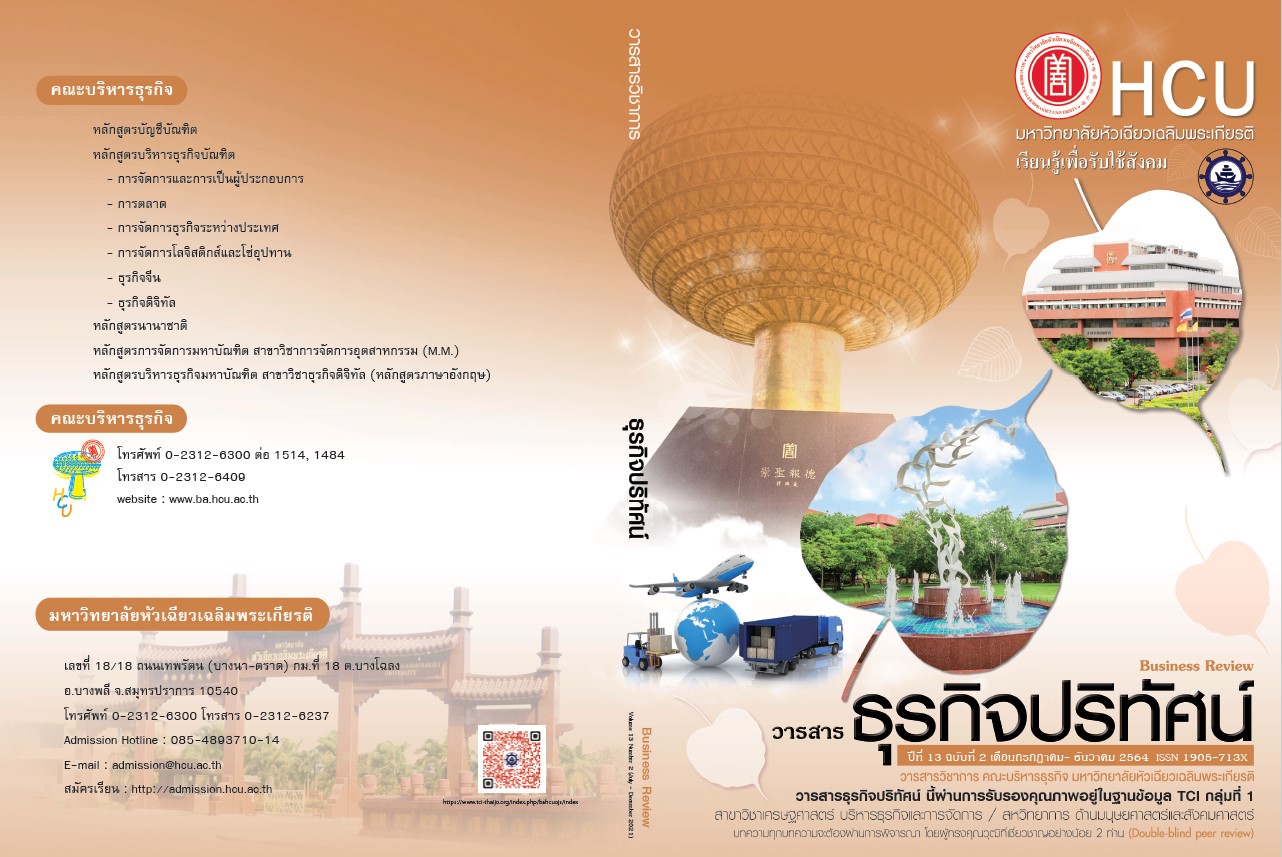Relationship between Total Quality Management Principles, Basic Quality of Working Life and Work Performance Efficiency
Keywords:
Total quality management, Basic quality of working life, Work performance efficiency, Structural equation modelingAbstract
This study has an objective to examine which total quality management principles and basic quality of working life affected employee’s work performance efficiency of Thai employee and dynamics of the relationship between them. Total quality management principles could help a business organization thrive in an increasingly business competitive and stimulate the generation of continuous Organizational improvement. Based on a comprehensive literature review, this study identified total quality management that encouraged basic quality of working life and improved employee working performance. The variables of basic quality of working life were intervening latent variables in the relationship. The sample group was comprised of 391 full-time employees from a total of 32 industrial companies of which has been ISO 9000 certified. Structural equation modeling (SEM) was used to analyse results. Results showed that total quality management principles had not a direct effected on the employee’s work performance efficiency but had an indirect positive effected on the employee’s work performance efficiency through significant development of basic quality of working life.
References
ณัฏฐพันธ์ เขจรนันท์. (2545). การจัดการทรัพยากรมนุษย์. กรุงเทพฯ : ซีเอ็ดยูเคชั่น.
Al-Damen, R.A. (2017). The impact of Total Quality Management on organizational performance Case of Jordan Oil Petroleum Company. International Journal of Business and Social Science, 8(1), 192-202.
Al-Ettayyem, R., & Zu'bi, M. F. (2015). Investigating the effect of total quality management practices on organizational performance in the Jordanian banking sector. International Business Research, 8(3), 79-90.
Almashad, S.O. (2015). Quality of work life and organizational commitment in Saudi Arabia: The role of job involvement and sense of efficacy. European Journal of Business and Social Sciences, 4(2), 141-158.
Amar, K., and Zain, Z.M. (2001). Barriers in the implementation of total quality management in Indonesian manufacturing organisations. Journal Teknik Industri, 3(2), 72-79.
Almansour. (2012). The relationship between leadership styles and motivation of managers conceptual framework. Journal of Arts, Science & Commerce, 3(1), 161-166.
Baldwin, K. (2008). Managing employee performance in seven steps (2nd ed.). East Sussex, UK: Author.
Bluestone, I. (1977). Implementing quality of work life programs. Management Review, 4, 43-46.
Crosby, P. B. (1996). Quality is still free: Making quality certain in uncertain times. New York: McGraw-Hill.
Deming, W. E. (1986). Out of crisis: Cambridge, MA: Massachusetts Institute of Technology, Center for Advanced Engineering Study.
Fatemeh, F., Kazemian, M., Damirchi, Q. V., Kani, B. K., & Hafezian, M. (2014). Quality of working life and employees organization commitment in Sari city health center. Journal of Research and Development, 1(9), 12-20.
Feigenbaum, A. V. (1961). Total quality control engineering and management: The technical and managerial field for improving product quality, including its reliability and for reducing operating costs and losses (2nd ed.). New York: McGraw-Hill.
Gherbal, N., Shibani, A., Saidani, M., & Sagoo, A. (2012). Critical success factors of implementing total quality management in Libyan organizations. In Proceedings of the 2012 International Conference on Industrial Engineering and Operations Management (pp. 80-89). Istanbul: Turkey.
Guimareas, T. (1996). TQM’s impact on employee attitude. The TQM Magazine, 8(1), 20-25.
Gowrie, G. (2014). Perceived Factors that Influence Teachers’ Quality of Work Life in Primary Schools in One Education District in Trinidad and Tobago. International Journal of Humanities Social Sciences and Education, 1(10), 101-113.
Gunawan, H., and Amalia, R. (2015). Wages and Employees Performance: The Quality of Work Life as Moderator. International Journal of Economics and Financial, 5(Special Issue), 349-353.
Hakala, D. (2008). 16 ways to measure employee performance. Retrieved June 2, 2011, from HR World Website: http://tompkinscountyny.gov/files2/workforceny/16%20Ways%20to%20Measure%20Employee%20Performance.pdf
Hair, J.F., Black, W.C., Babin, B.J., and Anderson, R.E. (2010). Multivariate Data Analysis. 7th ed. New Jersey: Prentice Hall, 647.
Jofreh, et. al. (2012). The Relationship between Quality of Work Life with Staff Performance of Iranian Gas Engineering and Development Company. Research Journal of Applied
Sciences, Engineering and Technology, 4(15) 2507-2514.
Karani, S.R., and Bichanga, W.O. (2011). Effects of Total Quality Management implementation
on business performance in service institutions: A case of Kenya Wildlife
Services. International Journal of Research Studies in Management, 1(1), 59-76.
Kannan, V.R., and Tan, K.C. (2004). Just in time, total quality management, and supply chain
Management: understanding their linkages and impact on business performance. Omega, 33(2), 153-162.
Konya, V., Matic, D., and Pavlovic. (2016). The Influence of Demographics, Job Characteristics and Characteristics of Organizations on Employee Commitment. Acta Polytechnica Hungarica, 13(3), 119-138.
Ngambi, M. T., & Nkemkiafu, A. G. (2015). The impact of total quality management on firm's
organizational performance. American Journal of Management, 15(4), 69-85.
Oluwafemi, O.J. (2009). Relationship of core job characteristics to job satisfaction and job involvement of construction workers in Lagos metropolis. African Journal for the Psychological Study of Social Issues, 12(1), 12-22.
Prajogo, D.I., and McDermott, C.M. (2005). The relationship between total quality management practices and organizational culture. International Journal of Operations & Production Management, 25(11), 1101-1122.
Prajogo, D.I., and Sohal, A.S. (2006). The relationship between organization strategy, total quality management (TQM), and organization performance-the mediating role of TQM. European Journal of Operational Research, 168(1), 35-50.
Rai, R., and Tripathi, S. (2015). A Study on QWL and its effects on Job Performance. Journal of Management Sciences and Technology, 2(2), 33-42.
Ramzan, H.A., et. al. (2014). Impact of compensation on employee performance empirical evidence from Banking sector of Pakistan. International Journal of Business and Social Science, 5(2), 302-309.
Raza, et. al. (2016). Impact of training and deveolpment, performance appraisal and rewardsystem on job satisfaction. International Review Management and Business Research, 5(2), 561-571.
Rothmann, S., & Coetzer, E. P. (2003). The big five personality dimensions and job performance. SA Journal of Industrial Psychology, 29(1), 68-74.
Sabet, E., Adams, E., and Yazdani. (2014). Quality management in heavy duty manufacturing
industry: TQM vs. Six Sigma. Total Quality Management & Business Excellence, 27(1-2), 215-255.
Sidin, J. P., & Wafa, S. A. W. S. K. (2014). Quality management implementation and quality of production in Malaysia’s manufacturing companies. International Journal of Research in Business Management, 2(3), 53-60.
Tabassum, A., & Rahman, T., & Jahan, K. (2011). A comparative analysis of quality of work life among the Employees of local private and foreign commercial banks in Bangladesh. World Journal of social science, 1(1).
Teryima, S. J., & Faajir, A., & John, E. (2016). Examining employee quality of work life as a determinant of managerial effectiveness in business organizations. The Business and Management Review, 7(3), 268-281.
Walton, R. E. (1974). Improving quality of work life. Harvard Business Review, 52(3), 12-16.
Zahari, M. K., & Zakuan, N. (2016). The effects of total quality management on the employee performance in Malaysian manufacturing industry. In Proceedings of Academics World
th International Conference (pp. 1-6). Istanbul, Turkey.
Downloads
Published
How to Cite
Issue
Section
License
All articles published in the Business Administration and Management Journal Review are copyrighted by the journal.
The views and opinions expressed in each article are solely those of the individual authors and do not represent those of Huachiew Chalermprakiet University or any other faculty members. Each author is fully responsible for the content of their own article. Any errors or issues found are the sole responsibility of the respective author.




